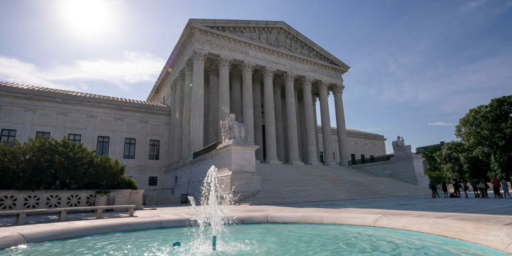Time For The Senate GOP To Give In On Merrick Garland Nomination?
With Donald Trump now confirmed as the GOP nominee, some conservatives are suggesting that the Senate GOP should just give in on the nomination of Merrick Garland to the Supreme Court.
With Donald Trump’s nomination as the GOP Presidential candidate now assured, and in the face of polling that shows Trump losing handily to Hillary, an editor at the conservative blog Red State is arguing that the Senate should confirm Merrick Garland’s nomination to the Supreme Court rather than risk the possibility of Hillary Clinton appointing an even less palatable nominee:
Now that Donald Trump is the presumptive nominee, this is not even a close call. There is absolutely no reason to drag this out any longer. Garland is not a great choice, but he is not a terrible one, either. And more than anything, he is old (for a modern Supreme Court appointment) and will be up for replacement in probably 10 years instead of 20 or 30.
Republicans must know that there is absolutely no chance that we will win the White House in 2016 now. They must also know that we are likely to lose the Senate as well. So the choices, essentially, are to confirm Garland and have another bite at the apple in a decade, or watch as President Clinton nominates someone who is radically more leftist and 10-15 years younger, and we are in no position to stop it.
(…)
In fact, if I were the Republicans, my main concern right now would be that Barack Obama would withdraw Garland’s nomination today. The fact that Merrick Garland still exists as an option right now is a gift that should not be squandered.
The calculus has changed – confirm Merrick Garland before it is too late.
As The Washington Post’s Callum Borchers notes, this isn’t the first time that the idea of confirming Garland has been raised on the right:
Confirm Merrick Garland if you think Hillary has a better than even chance of victory in November. … Garland is an excellent judge, about the best one could expect from Obama. One could do much worse, and certainly would with Hillary. (American Spectator, March 16)
It does seem that Merrick Garland is genuinely less liberal than some of the other choices. Given his age (63), a ghoulish look at the actuarial tables tell us that he’s likely to be on the Court for only about 15 years or so. Senate Republicans should take this deal. (Buckley Club, March 16)
If … McConnell stands firm, he’s blowing an opportunity to confirm a nominee who’s likely to be more “moderate” than what President Hillary will offer next year. The conventional wisdom on Trump right now is that he’s a dead duck in the general election barring some sort of national crisis. (Hot Air, March 16)
If polls showed Trump’s candidacy in serious trouble, Republican senators might opt to confirm a man who appears to have a moderate streak in him rather than allow Hillary Clinton to nominate a young, hard-core progressive who would vote against every conservative constitutional and legal principle for the next several decades. (The Blaze, March 21)
Hot Air’s Allahpundit, who made one of the arguments in favor of confirmation quoted above, pushes back against the Red State suggestion that the GOP give in on the nomination:
I’ll give you three reasons why confirming Garland would be a bad idea. One: It’d be a concession by the Senate leadership that Trump can’t win this fall. That’s probably true, enough so to arguably make Garland’s confirmation worth doing, but Trumpers would resent the pessimism bitterly. That might cost Republican Senate candidates some votes this fall. Two: It’d play into the conservative narrative that McConnell caves too easily and the establishment GOP is effectively in cahoots with Obama. Never mind the fact that Democrats have most of the leverage on this nomination, with Garland or a more liberal nominee the two likeliest outcomes by far. If McConnell caves, some already demoralized conservative voters may decide that it’s not worth turning out this fall to save the Senate notwithstanding their antipathy to Trump. That would mean Senate incumbents suddenly have a problem on both flanks of the party, Trumpers and anti-Trumpers. That’s a high hurdle to clear. Three: Wolf thinks Obama might yank Garland’s nomination at any moment, making action by the Senate urgent. I don’t. Doubtless Obama would prefer a nominee further left, but Garland’s plenty liberal and he accepted a thankless task in agreeing to be nominated at a moment when Senate Republicans were swearing up and down that they wouldn’t confirm a replacement for Scalia this year. Pulling the nomination at the very moment Democratic victory in November becomes likely would be a grievous snub to a guy who volunteered to be a potential sacrificial lamb. It would be shabby even by Obama’s standards. Although, if McConnell’s really worried about this, he could simply issue a statement affirming that he has no intention of holding a floor vote on Garland before the election but he reserves the right to revisit the question in the lame-duck session. That would be a public signal to O that Garland might end up on the Court anyway. Obama would have no reason to withdraw the nomination after that.
The fact that this suggestion is being made by the same wing of the Republican Party that was among the first to push the idea of “No Hearings, No Votes” in the wake of Justice Scalia’s death is, perhaps, the best example yet of what this strategy has really been all about from the beginning. Contrary to the assertion that Republicans in the Senate believed that the American people should have a say in selecting the next President before such a radical change in the direction of the Supreme Court is made, this has always been about the hope among Republican Senators and conservative activists that a Republican would be elected President in November and the desire to keep the seat open for that President to select Scalia’s replacement rather than allowing President Obama to do so. Now that it’s clear that the Republican nominee is someone who is likely to lose to Hillary Clinton, and given the fact that President Obama gave the Senate GOP the seeming gift of a seemingly moderate nominee who, because of his age, is unlikely to be on the Court for much more than fifteen years, some of the same people who were calling the loudest for the Senate GOP to stand firm on “No Hearings, No Votes” are starting to crack in the face of the prospect that Hillary Clinton would select a younger, far more liberal, nominee who could play a role in reshaping the Court for decades to come.
So far at least, there’s no indication that Senate leadership is at all inclined to back away from its current position. Just yesterday, for example, Judiciary Committee Chairman Chuck Grassley suggested that he was confident that Donald Trump would make good judicial appointments if he were elected and largely dismissed the argument raised by Red State and others that the GOP ought to confirm Garland rather than risk a more liberal appointment by a President Hillary Clinton. In the end, though, it is rather obvious that the entire “No Hearings, No Votes” strategy has been a massive political calculation on the part of the Senate GOP. The first part of the gamble is that holding off on any action on the nomination won’t really harm Republicans politically, and so far at least that gamble seems to be paying off. While polling does indicate that the American people as a whole oppose what the Senate is doing, there’s little evidence that taking this position is actually harming Republicans in a lasting way that will matter in November. The second gamble is that the GOP will somehow manage to win the White House. If and when it becomes more apparent that either of those things may no longer be true, the more likely it is that we’ll see the Senate act. Until then, though, expect them to stand firm and for Garland’s nomination to go nowhere.






This highlights yet another problem facing Republicans. Their intelligentsia is overflowing with idiots, fools and whack jobs. Trump was already leading the field when they almost universally embraced the #neverGarland stuff, demonstrating that they couldn’t even game this process out in a rudimentary way.
Mike
They can use the fear of a liberal Justice (well moderate centrist actually, but that’s another story) to drive turnout. Turnout they desperately need to hold seats all the way down ticket. And some of the people making the decision are in those seats.
Choosing to make small sacrifices now to ensure a moderate justice for years requires a level of strategic thinking and party discipline I do not believe the Republicans are currently capable of exercising.
As usual, Obama makes the mistake of being the responsible grown-up and assuming that his overtures will be recognized and appreciated by a loyal opposition. Guess a tiger can’t change his stripes.
I remain disappointed Mr. Obama did not nominate a more liberal-leaning justice but I will tolerate Garland – as noted above we’ll have another shot at a more liberal justice in a decade or so.
McConnell made a huge mistake when he said “no hearings” on Garland, and now has boxed himself in with no good options. It was a totally unforced error.
And it’s this kind of gross political malpractice that is a major factor in Trump’s success so far.
“Now that it’s clear that the Republican nominee is someone who is likely to lose to Hillary Clinton…”
That should have always been the case. The electoral vote map never favored the GOP for this election, regardless of which Republican was nominated.
I’m still not totally sure why everyone thinks that Hillary would want to nominate a “far more liberal” candidate. Do people actually think Hillary is more liberal than Obama? I sure as hell don’t. She’s one of the most centrist people in the party.
@Ben:
Obama’s choice of nominee was influenced by timing. The president wanted to minimize the GOP’s ability to turn his nominee into an election wedge issue.
Clinton won’t have to worry about any of that. And if the Dems can take back the Senate, her job will be that much easier. She’s a social liberal, and her choice of nominees should reflect that.
@Ben:
“I’m still not totally sure why everyone thinks that Hillary would want to nominate a “far more liberal” candidate.”
Garland is about as conservative as you can get and still be a Democrat. He was a deliberately centrist pick by Obama to give a fig leaf to any Republicans who were willing to vote for a person nominated by Obama. If Hillary wins in November, the Senate is likely to turn as well, and she will not need to choose someone centrist, but instead someone who is a middle of the road Democrat.
@Jenos Idanian: It wasn’t unforced. It was part of McConnell’s strategy (and general Republican strategy) since becoming Majority Leader/claiming majorities in Congress. Every major piece of legislation would need to await the next president. You can scour the Internet and find plenty of examples. This particular strategy seems to have come out of a conference in 2014, and Boehner was the first to really promote it.
Really, it’s been the same strategy since before then. Deny Obama any possible legislation that might make him look better in history books. Utter scorched earth. No legitimacy. Frame him as a tyrant and hope for the short-term electoral gain. It worked, arguably to the nation’s detriment, up until Trump.
@Ben: She’s a centrist from a pragmatic, policy level–in other words, what can be done vs. what she’d like to accomplish.
If she’s elected and she has a Democratic Senate behind her, she’ll be able to shape the Court for decades–best way to do that is to nominate more liberal justices, especially in the first two years of her administration (I predict that if she’s elected and the Senate goes D, Ginsburg and possibly Breyer will announce their retirements).
It would have to be that quick because of the number of Senate seats the Democrats will be defending in 2018.
@Jenos Idanian: Agreed. But to be fair, he presumably still felt that Trump wouldn’t get nominated. A mistake many of us have made.
I’ll make this simple. Thanks to the Republicans’ crazy, media inflamed base, there will NEVER be enough Senate Republicans willing to go on record and break a Republican filibuster so as to put a fifth liberal on the Supreme Court, regardless of logic or political calculation. This will hold even through the lame duck period.
This means that the only way that HRC will be able to confirm a SCOTUS nominee will be :
1. If she has a Democratic Senate majority
2. If they nuke the filibuster for SCOTUS appointments.
Merrick Garland’s doomed nomination will simply drive this lesson home for Democrats and independents and for whatever Broderist, both-sides- do-it media that remains .This way, when Schumer nukes the filibuster next year, the will be little media outcry.
If they confirm Garland, we get an excellent centrist jurist to replace the partisan hack. If they don’t, we get an excellent center-left jurist to replace the partisan hack.
Go back to being the Pee Pee Police, GOP. It’s what you’re best at.
@Ben:
Contrary to left wing propaganda, HRC by voting pattern has been one of the most liberal members of the Senate.
I think she is almost certain to pick a young liberal to replace Scalia, especially since she won’t have to worry about a filibuster (see my earlier post).
@Jenos Idanian:
Put succinctly and well.
@Ben:
If President Clinton gets to nominate the next SC judge, then she will be doing it with a mandate. She’ll still need to find a candidate that can survive confirmation, but she won’t necessarily need to pick a “centrist” candidate, and having just won the contest in which a SC pick was a factor, she probably wouldn’t.
To the victor go the spoils.
@Ben:
This ignores the fact that Garland is not a Sotomayor or Kagan, who are probably both more liberal and still younger. Obama didn’t nominate a young liberal for the court. It’s easy to appoint someone who is both more liberal and younger than Garland, who’s nomination was influenced by the difficulty he was going to face being confirmed.
@stonetools:
“Merrick Garland’s doomed nomination will simply drive this lesson home for Democrats”
Yes
“and independents”
Maybe — depends on how much attention they have been paying.
“and for whatever Broderist, both-sides- do-it media that remains .This way, when Schumer nukes the filibuster next year, the will be little media outcry.”
No way, no how.
@Jen:
The end result of that will be a liberal majority on the Supreme Court for the first time since the 1960s-a liberal majority that might last 20 years.
If Clinton and the Senate Democrats execute this play, even if they don’t do another thing, this will make the Clinton Administration a consequential one.
@Franklin: Agreed. But to be fair, he presumably still felt that Trump wouldn’t get nominated. A mistake many of us have made.
Let me clarify what I’m thinking: McConnell felt (rightly, I think) that he had to make some kind of conciliatory gestures towards the Tea Party and, generally speaking, the more conservative elements of the GOP base. Then Justice Scalia died, and that got a lot of conservatives speaking up quite loudly. McConnell saw that as a chance to score points with those people by picking a fight with Obama.
Now, that in and of itself wasn’t a bad idea. But the way he chose to do it — to announce that no matter who Obama nominated, there wouldn’t be any hearings — played right into Obama’s hands. It readily fit itself into Obama’s narrative of the obstructionist Congress, how they aren’t the least bit interested in working together and finding common ground, how the GOP was dead-set against anything Obama said or did, without even giving it the slightest consideration.
Which, in this case, is exactly what it was.
McConnell chose to pick a fight where he started off by forfeiting the high moral ground. He started a fight where he gave the other side all the advantages.
And he left himself with no way out where he could win. Hell, he couldn’t even break even.
If he holds to his position, he is doing exactly what the Democrats have been whining about all along.
If he backs down, he gives the base yet another example of how contemptuously they are held by the GOP establishment. Because even though it was a bad promise to make, he made it.
To sum up: this is precisely the kind of gross political malpractice that gave Donald Trump the nomination. The establishment set up a system that they thought would give them a strong hand in selecting the eventual nominee, even if it got down to the final two candidates standing. They figured that the anti-establishment would quickly settle on one candidate.
Instead, two candidates who both despise the establishment ended up the last two standing. (Kasich doesn’t count, for far too many obvious reasons.) They ended up having to decide between the candidate they hated (Cruz) and the candidate they hated and feared (Trump), and by the time they reconciled themselves to backing Cruz, it was too late.
There are some things I like about Trump, and some I don’t like. But one thing that has tremendous appeal to me is that he’s attacking — and devastating — a lot of people whose suffering fills me with tremendous satisfaction. In brief, as far as I’m concerned, he’s pissing off the right people.
But back to McConnell: he put himself (and his supporters) in a very bad position, of his own free will. Considering a lot of the other things he’s done, I view his discomfort with more tremendous satisfaction.
@James Pearce:
It will be more than a mandate, it will be a Call to Action and Mrs. Clinton will make sure everyone knows it.
She’s got hours of videotape showing McConnell, Grassley and other Republicans in the Senate declaring that the American people should have a say in the make-up of SCOTUS by selecting the President who’d be in a position to set the direction of the Court for the coming years. Well, The People will have had their say and their say will be Mrs. Clinton. She’d be a fool not to beat the Senate Republicans over the head with their stand on this.
And Clinton’s no fool.
@Jenos Idanian:
Just out of curiosity, what “moral high ground” did McConnell ever hold that you would say he forfeited? The President selects SC judges. The Senate advises and confirms. There’s nothing moral about it.
This Judge Garland seems like a nice, level headed person, not prone to wandering off in all directions, engaging in some sort of judicial activism, or rewriting the Constitution.
Omigawd! They’ve been playing politics on this all along! I can’t believe it!
@Jenos Idanian: Wow! Two insightful (and mostly calm and polite) comment from Jenos in one day. I can’t believe that either!
Where have the alien pod people put the real Jenos?
@Scott F.: Just out of curiosity, what “moral high ground” did McConnell ever hold that you would say he forfeited? The President selects SC judges. The Senate advises and confirms. There’s nothing moral about it.
First up, let me say that I think McConnell is on solid Constitutional ground in his stance. His “advice and consent” is “my advice is don’t bother sending us any nominees, because we ain’t gonna consent.” There is no explicit obligation on the Senate to give any nominee a vote.
But, by issuing that refusal before Obama named his nominee, McConnell (if you’ll forgive the wordplay) changed the fight from about principles to one about principals. Americans have an innate sense of fair play, and a lot of people think that Garland deserves his day in the Senate.They think he deserves his chance to be heard, on his own merits.
I happen to be one of those. From what little I’ve heard about Garland, I’d oppose his nomination, but I think he should be given his hearings.
As far as the arguments that “Garland is as illiberal as Obama or Clinton will go, so we might as well accept him,” that carries with it the assumption that Obama and Clinton have the stamina to outlast the Senate, and will keep sending nominees longer than the Senate can keep saying no. I’d like to see that at least challenged, and the Senate could use this as a chance to reclaim some of the power (and responsibility that Congress has surrendered over the years, and presidents have taken up.
One strategy I’d consider would be the Senate holding their hearings, have a couple of Senators spell out a few reasons why the nominee is unacceptable, then have a quick vote rejecting the nominee, all within a couple of days. The effect would be the Senate giving Obama’s nominees the courtesy of being addressed on their own merits, while keeping up the pressure on Obama to come up with a nominee that is acceptable to the Senate. After all, in this process the Senate is a co-equal part of the process, not subordinate to the president, and that apparently needs to be reasserted.
If McConnell had simply said something like “we in the Senate have a vastly different idea of what ‘qualified’ means than the president does, and he would be well advised to remember that Constitutionally, we are his peers in this process, not his subordinates,” then he’d be on more solid ground, legally and in the eyes of the American people. Instead, he thought he’d pander to his base. And he did so in a solidly inept fashion.
Like Hillary Clinton and her e-mail server, McConnell is cowering behind a purely legalistic shield, insisting that his position is within the letter of the law. Like Obama and his “red line” in Syria, he has staked out a position that he simply can’t sustain, and will have his credibility severely — if not permanently — damaged for doing so.
These are all examples of gross political malpractice, of utterly unforced errors by people who are supposed to be the best our political class can present. And it is such gross acts of political malpractice that gave us the successes of Donald Trump and Bernie Sanders.
It’s no coincidence that both men suddenly developed huge (I’m sorry, YUUUUUGE) followings within parties that, until recently, they didn’t really belong to. When the rank and file can’t find the leadership they want within their party, they’re going to look elsewhere.
BTW, one final aside: Trump understands this far better than Sanders does. A good chunk of his actions in the past couple of months have been aimed at peeling off a hunk of Sanders supporters away from the Democrats. And to me, the question isn’t whether it will work, but how well.
It’s become a cliche’ to say that “this election is unlike any other in history,” but in this case I think it’s truer than ever. We essentially have two third-party candidates who chose to co-opt one of the existing parties for their own purposes, and one actually succeeded. Who was the last party outsider to actually win the nomination?
@Just ‘nutha ig’rant cracker: Wow! Two insightful (and mostly calm and polite) comment from Jenos in one day. I can’t believe that either!
Where have the alien pod people put the real Jenos?
I have a rather dedicated fan base that loves to get me into mud-flinging contests, and I sometimes have difficulty staying above it.
This time, I threw them some red meat in the “Jumped the Shark” thread in the hopes it would keep them off this thread. It appears to have worked for now…
@Jenos:
Because it was implicitly understood as necessary, the same way its implicit one must turn on a car in order to fulfill its purpose of being driven. If you are looking for explicit instructions, voting is not explicitly listed as something the Senate has the right to do in this process, nor does it say what constitutes the Senate (majority, 2/3, one guy sending a letter?). Obama would be able to make a case that “advise and consent” means a thumbs up if you are relying on things being spelled out. This is a very poor talking point for the R’s since it fairly clear we’ve been interpreting this for centuries rather then having a specific “the Senate votes” wording to work with.
No, they are not his peers in this process, they are very explicitly his advisers. Adviser =/=peer, not in the classical regal sense of the words nor in governmental terms. One does not need to accept the advice one is given. They do, however, have to consider the nominee since the wording for the President’s right is stronger: “shall” is an imperative and is used twice in the same sentence to emphasize its importance, “by and with” are cooperative in nature. Now, they do not have to give consent but the wording is fairly clear that the nominee is to be give the dignity of a second’s thought before the rejection comes.
Completely. Stupid is as stupid does. Garland had the right to a hearing and to prove himself worthy of the bench, the Senate has the right to grill him to be able to grant informed consent, Obama has the right as President to his Constitutional duties. Garland does not have the right to the SC, the Senate does not have the right to be petulant obstructionists in defiance of their duties and Obama doesn’t have the right to victory on the first try. All anyone is entitled here to is a chance and a part in the process.
And all this started before Scalia’s body was cold. Inept doesn’t begin to describe it.
@KM: Actually, I believe it does make them “co-equal.” It’s part of the checks and balances system of our three branches of government — it’s the check on the power of the Court. It takes the cooperation of both the Executive and the Legislative to put a new member on the Court.
But while you can argue that, semantically, Congress is obligated to give a nominee a hearing, (or, for that matter, a president to make a nomination), there’s no enforcement mechanism. You can’t impeach Congress — Congress does the impeaching. The Court can’t order them, as the “advise and consent” is an exclusive power of Congress.
So much of our government is based on people abiding by a lot of unwritten rules. And we’ve learned in recent times that if someone simply gets into their head to break those unwritten rules, there’s not a hell of a lot we the people can do about it.
@Jenos Idanian:
Clearly, McConnell didn’t want to hold a sham hearing – that is, a televised sham hearing – which would provide endless video footage of the charade.
It’s bad enough to have guys like Mitch McConnell effectively saying that a lame duck term might be 3.9 years long, but video footage of Committee Republicans struggling to say ‘no’ while trying to suppress smirks or smiles, that’s rubbing salt into the wounds.